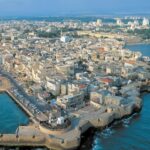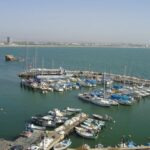Weather
The following is the climate typical of our region throughout the year:
March-June – pleasant weather
July-August – hot weather
September-November – pleasant weather
December-February – winter climate with occasional showers
What to Pack
Israel is a modern, developed country, and you can purchase virtually anything you need during your stay, including clothing, cosmetics, and hygiene products.
If you are visiting Israel during the summer you will need lightweight clothing – short-sleeved and sleeveless shirts, shorts, sandals, beach shoes and a bathing suit. It’s also a good idea to pack a sweater or jacket, since nights in the mountains and the desert can be cool.
If you are visiting Israel in the winter, you will need warm clothing, a coat (preferably a raincoat as well), good shoes, an umbrella, gloves, a scarf and other warm clothing. Weather in Israel is not cold as it is in Europe, but days can be rainy and chilly.
Entering Holy sites requires appropriate and modest clothing.
Women are required to cover their head and shoulders; men are expected to wear knees length pants.
Electrical Appliances
The Israeli power supply is single phase 220 volts at 50 Hertz. Most power sockets in Israel have three pinholes, but many of them will work with double-pin European plugs. Visitors who want to use shavers, traveling irons and other small appliances may need both transformers and adaptor plugs
Languages
In Old Akko, the following languages are used:
Hebrew, English, Arabic, Russian and French.
Direction signs in the city are in 3 languages: Hebrew, English and Arabic
and at the tourist sites you can get guiding headsets in 10 languages: Hebrew, English, Arabic, French, Russian, Italian, German, Chinese, Spanish and Portuguese.
Transportation
Israel is a small country, which makes getting around fast and convenient. Taxis are common in Israel for urban and interurban travel and can be flagged in the street or booked via phone or designated international apps such as GetTaxi.
The main forms of public transportation are buses and the national train service both offering a convenient, reasonably priced means of travel to nearly every destination in the country.
Train Information Services: www.rail.co.il / Tel: 08-6831222 or *5770
Buses Information Services: www.bus.co.il / Tel: 1-900-72-1111
Tickets can be purchased at the ticket booths in the central bus station in each city or town, or from the driver. Most of the bus lines do not run on Shabbat or on Jewish holidays. Service ends on Friday afternoon and resumes Saturday evening.
Transportation to AKKO
Arrival by train
There are regular hourly trains leaving from the center of Israel and Ben Gurion Airport. The train ride from Tel Aviv to Akko lasts about an hour and 20 minutes.
The train station is at walking distance (approx. 15 minutes) from the Old City; alternatively, you can take a taxi.
Arrival by bus
The following is a breakdown of the main bus routes to Akko:
- Egged bus lines from the center of the new city to the old city: bus numbers 61 and 62
- Egged bus lines from Haifa to Akko City: bus numbers 251 + 271
- Egged bus lines from the North – Karmiel and Kiryat Shmona to Akko City: bus numbers 501 + 360
Arrival by car
By Waze: 1 Weizmann St., Akko
The Israeli currency
The Israeli currency is the Shekel (officially “New Israeli Shekel” – NIS).
Emergency Telephone Numbers
The following are a few essential telephone numbers in case of emergency:
- Magen David Adom – 1 Yosef Gadish St., Akko – Tel: 101
- Fire Department – 1 David Remez St, Akko – Tel: 102
- Police – HaHagana St., Akko – Tel: 100
- Community Police – 1 Weizmann St., Old Akko – Tel: +972-4-9876736
- Visitors Center and Reservations – 1 Weizmann St., Old Akko – Tel: 1-700-70-80-20
- The closest hospital to Akko: Galilee Medical Center in Nahariya – Tel: +972-4-9107107





